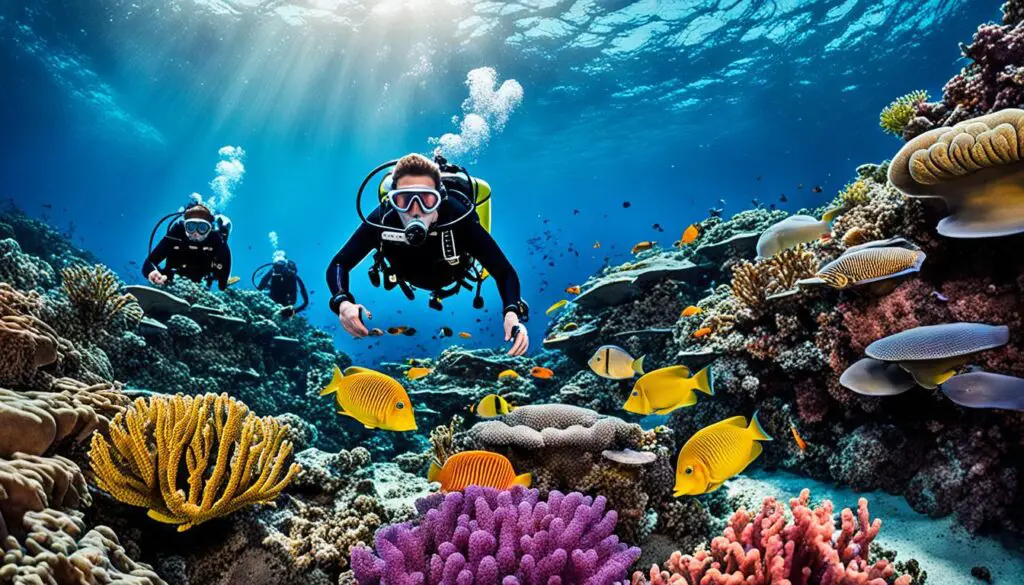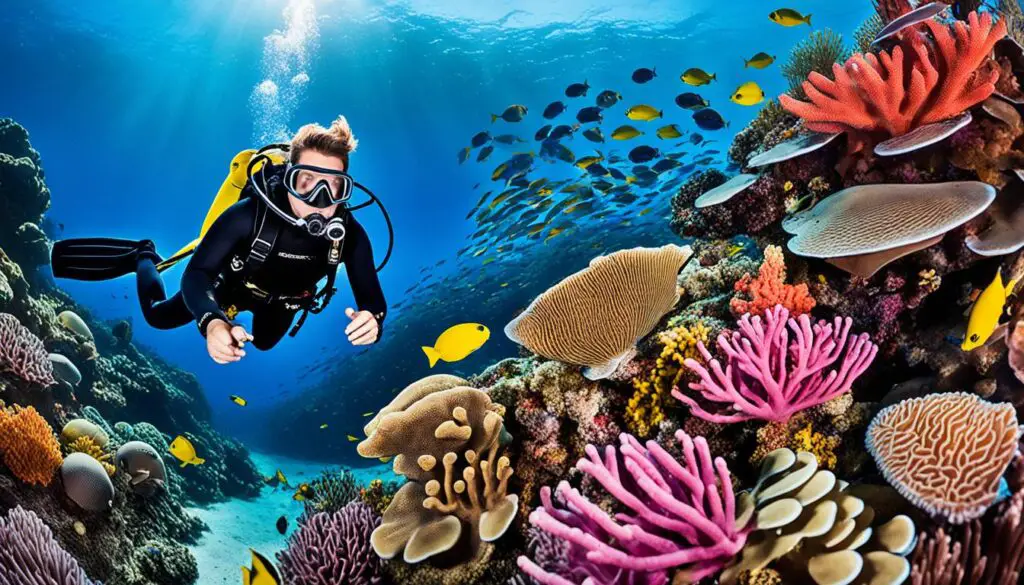Do you love the underwater world and want to explore it? If you’re new to diving or a pro, there’s diving info for you. Remember, your skill decides your level, not how many dives you’ve done. Everyone can keep learning and getting better at diving.
For beginners, there’s a whole world of diving to discover. They start by learning basic skills like how to control their buoyancy and swim with fins. These skills are key to having fun and staying safe while diving.
Intermediate divers have mastered the basics. They can comfortably dive in various places, like reefs and sunken ships. They’re ready for more adventures around the globe.
Advanced divers are experts in diving. They can breathe properly on the way up to avoid getting sick and handle tough dive situations. They’re really in tune with the underwater world.
Expert divers know it all and can even teach others. They’re an amazing help for new divers looking for tips and chances to learn more.
Diving certifications differ depending on the organization, like PADI or SSI. These groups have set plans to help you get better and get certified. You can pick the one that fits your goals best.
Key Takeaways
- Beginner divers focus on mastering buoyancy control and finning techniques.
- Intermediate divers can navigate different water types.
- Advanced divers can adjust their breathing during ascents to prevent decompression sickness.
- Expert divers have extensive experience and are qualified to teach others.
- Certification levels vary among organizations like PADI, SSI, and NAUI.
Different Certification Levels for Scuba Diving
Scuba diving offers a range of certifications for all kinds of divers. These certifications help you gain skills and knowledge for safe diving. No matter if you’re a beginner or looking to improve, there’s a course for you.
Among the top diving groups is PADI. They have many courses, including the Open Water Diver certification for beginners. With this, you’ll build a solid diving foundation. After getting certified, dive into the underwater world without fear.
PADI also has the Advanced Open Water Diver certification. This next step lets you dive deeper into specialty areas like night diving. It’s a chance to learn more and have fun in several dive settings.
If you’re interested in helping others dive safely, consider the Rescue Diver certification. It’s all about responding to emergencies. With this skill, you’ll be ready to assist during tough times underwater.
Besides PADI, other groups like SSI, NAUI, BSAC, SDI, and RAID also offer certifications. You have plenty of options to choose from for your diving journey.
Special certifications cater to your specific diving interests. If you love boats or want to protect coral reefs, there are courses just for that. You can also learn wreck diving or underwater photography. These options will make your diving experience richer.
If you’re just starting, check out the Discover Scuba program. It’s a great way to get a taste of diving under expert guidance. This trial run can help you decide if scuba diving is for you.
Getting a scuba diving certification brings many benefits. It equips you with skills for safe diving. Plus, it opens doors to explore new dive sites and connect with the diving community. With a certification, you’re ready for amazing underwater adventures.

Why Get Certified?
“Becoming certified is a must for anyone who loves diving. It keeps you safe and lets you see new places underwater. With a certification, you can dive anywhere with confidence and enjoy the ocean’s beauty.”
Dive Courses and Opportunities for Certified Divers
After you get your diving certifications, the adventure continues. You’ll find many dive courses and chances to improve your skills and dive in new places.
Advanced Open Water Diver
The Advanced Open Water Diver course lets you dive deeper into the sport. You get to explore more dive sites and work on your diving skills. This course includes deep dives, navigation, and photography under the water.
Divemaster and Instructor Training
If you love diving and want to turn it into a job, consider becoming a divemaster or instructor.
As a divemaster, you can help at dive shops or on boats, guiding dives and helping divers. If you become an instructor, you’ll teach diving courses and help others enjoy diving.
Exploring Unique Diving Techniques
Diving is more than scuba. Freediving lets you go deeper without scuba gear, connecting you with the sea differently.
For a bigger challenge, try technical diving. It allows you to explore deeper and harder places like wrecks and caves.
Mermaid diving is for those who dream of swimming like a mermaid. You wear a tail, making your dive magical and unique.
Emergency First Response and Digital Scuba Programs
Being ready for emergencies is key for all divers. The Emergency First Response course teaches you first aid and CPR. You learn to help both in and out of the water.
Today, you can learn to dive online anytime, anywhere thanks to digital scuba programs. These programs let you learn the theory from home. Then, you practice in the water with your instructor.
Don’t stop at your first diving qualifications. Keep learning and enjoying new dive experiences that will make your underwater adventures truly special.

| Courses | Description |
|---|---|
| Advanced Open Water Diver | Gain access to more dive sites and develop advanced underwater skills. |
| Divemaster | Become a professional dive guide, working in dive shops, resorts, or on liveaboards. |
| Instructor | Teach others and share your passion for diving as a certified instructor. |
| Freediving | Explore the underwater world without scuba gear, diving on a single breath. |
| Technical Diving | Challenge yourself with more complex dives, such as wreck or cave exploration. |
| Mermaid Diving | Experience the thrill of swimming like a mermaid, wearing a mermaid tail. |
| Emergency First Response | Learn essential first aid and CPR skills for diving and everyday emergencies. |
| Digital Scuba Programs | Take advantage of flexible online learning to advance your scuba knowledge. |
Conclusion
If you are just starting or have lots of diving under your belt, there’s something for everyone. Get certified and keep learning. This way, you can get better at diving, see more places, and maybe make it your job.
Stay safe when you dive, practice often, and have fun underwater. Happy diving!
FAQ
What determines the different diving levels?
Diving levels depend on your skill, not how many dives you’ve done. Beginners focus on basic skills like controlling their buoyancy in the water. Learning how to move with fins is also key. For intermediate divers, they know these skills well and can handle various water conditions.
Advanced divers feel comfortable in any underwater environment. They understand the importance of proper breathing to avoid issues like decompression sickness. Those at the expert level have a vast amount of experience. They are also qualified to teach. Different organizations like PADI, SSI, and NAUI offer these certifications.
What are the different certification levels for scuba diving?
Many organizations provide scuba diving certifications. For starters, PADI has the Open Water Diver course, which is the first step. Then, there’s the Advanced Open Water Diver course that allows for more training. Plus, the Rescue Diver course teaches you how to handle emergencies.
Other groups like SSI and NAUI, and more, also offer courses. You can specialize in areas like boat diving or helping with coral reef protection. If you’re just starting, a Discover Scuba program is a good first step.
In this program, you’ll get a feel for what it’s like before moving on to official certification.
What opportunities are available for certified divers?
Certified divers have many paths they can take. They can move up with the Advanced Open Water Diver course, which opens up new diving spots. Want a job in diving? Become a divemaster or an instructor. You could then work at dive shops, resorts, or on liveaboards.
If you’re looking for more unique options, there’s freediving, diving for technical challenges, mermaid diving, or learning first aid. PADI also has digital courses for learning on your own time.
